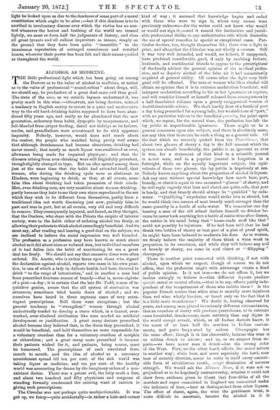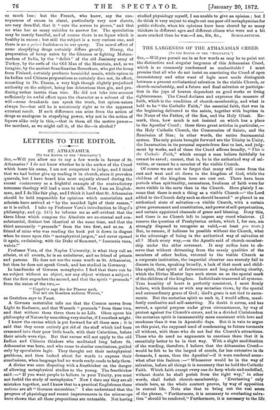ALCOHOL AS MEDICINE.
THE little professional fight which has been going on among the Doctors as to the value of alcohol in medicine, or rather as to the value of professional " round-robins " about drugs, will, we should say, be productive of a great deal more evil than good. The state of the case, as we outside lay men understand it, was pretty much in this wise :—Observers, not being doctors, noticed a tendency in English society to revert in a quiet and unobtrusive way to the old hard-drinking habits supposed to have been aban- doned fifty years ago, and really so far abandoned that the new generation, sedentary from habit, dyspeptic by temperament, and full-blooded from proper feeding, dared not indulge as its fathers, uncles, and grandfathers were accustomed to do with apparent impunity. Nobody, however, would have said much about the matter, the people who watched being pretty well aware that although drunkenness had become obnoxious, drinking had never ceased ; that nearly as much liquor was swallowed as ever, allowance being made for impaired physique ; and that the diseases arising from over-drinking were still frightfully prevalent, though slightly changed in type. But an idea spread among them just at the same time that the habit had extended itself, that women, who during the drinking cycle were as abstinent as Hindoos, were beginning to drink, or that, at all events, some false idea about drinking had taken possession of their minds. Men, even drinking men, are very sensitive about women drinking, partly because they hate to see their own vices reproduced in the sex which they wish to be different from themselves, partly from a traditional idea not worth discussing just now, probably false in part and true in part, but at all events, very old and very difficult to remove. They consequently inquired, and found, as they thought, that the Doctors, who share with the Priests the empire of interior society, were in the habit either of ordering alcohol too freely, or allowing theirpatients to think alcohol exceedingly beneficial. And we must say, after reading and hearing a good deal on the subject, we are inclined to believe the social impression was well founded. The profession as a profession may have known as much about alcohol as it did about aloes or reduced iron, but individual members of it had fallen into the habit of sanctioning its use a great deal too freely. We should not say that excessive doses were often ordered. Dr. Anstie, who is rather fierce upon those who signed the declaration against alcohol, reports two cases in his own prac- tice, in one of which a lady in delicate health had been directed to drink "to the verge of intoxication," and in another a man had been prescribed fourteen ounces of brandy—that is, seven-eighths of a pint--a day ; it is certain that the late Dr. Todd, a man of in- quisitive genius, aware that the old system of starvation was erroneous, sometimes tried heroic doses of alcohol ; and we ourselves have heard in three separate cases of very extra- vagant prescriptions. Still these were exceptions ; but the general tendency to " strengthen " women through alcohol undoubtedly tended to develop a crave which, in a heated, over- worked, over-vitalized civilization like ours needed no artificial development or justification. A great many doctors prescribed alcohol because they believed that, in the doses they prescribed, it would be beneficial, and held themselves no more responsible for a voluntary overdose than for a voluntary overdose of morphia or chloroform ; and a great many more prescribed it because their patients wished for it, and patients, being scarce, must be humoured. The prescriptions of each circulated from mouth to mouth, and the idea of alcohol as a necessary nourishment spread till ten per cent. of the sick world was taking liquor as medicine, and ten per cent. of the healthy world was accounting for drams by the imaginary orders of a non- ems' tent doctor. There was a patent evil, the laity made a fuss, and about two hundred and fifty physicians and surgeons of standing formally condemned the existing want of caution in giving such prescriptions.
The Circular was not perhaps quite unobjectionable. It was got up, we fancy—quite accidentally—in rather a hole-and-corner
kind of way ; it assumed that knowledge began and ended with those who were to sign it, whose very names were previously unknown—for the writer could not know who would or would not sign it ;—and it roused the instinctive and justifi- able professional dislike to any authoritative rule which discredits the use of special remedies in special or exceptional cases. Par- ticular doctors, too, thought themselves hit ; there was a fight in print, and altogether the Circular was not wholly a success. Still it was very well intended, and would, we believe, if unopposed, have produced considerable good, if only by enabling fathers, husbands, and confidential friends to oppose to the prescriptions of the family adviser the general opinion of the medical profes- sion, and so deprive alcohol of the false air it had momentarily acquired of general utility. Of course after the fight very little good will be effected. The man or woman who likes alcohol will obtain an opinion that it is in extreme moderation beneficial, will interpret moderation according to his or her ignorance or caprice, and will consider himself or herself released from consequences by a half-fraudulent reliance upon a grossly exaggerated version of doubtful scientific advice. We shall hardly hear of a bottle of port a day being prescribed for a young lady, but we shall hear of "port," with no particular rule as to the beneficial quantity, the point upon which, we repeat, for the second time, the profession has left the lay public in unpardonable ignorance. There ought to be a general consensus upon nho subject, and there is absolutely none, nor any idea that there can be such a thing as a general rule. Of the fact which we recently quoted from the Practitioner, that about two glasses of sherry a day is the full amount which the system can absorb beneficially, the public is as ignorant as ever it was, for a statement of that kind in a scientific journal is never seen, and in a popular journal is forgotten in a fortnight, while on the equally important subject, the equi- valents of those two glasses, the lay public is hopelessly at sea. Nobody knows anything about the proportion of alcohol in liquors. Ask any man without spe cial knowledge how much beer, port, brandy, or claret is equal to two measured" glasses" of sherry, and he will reply vaguely that beer and claret are quite safe, that port is heady, and that brandy should always be " qualified " by soda- water. " Qualifying " strychnine would strike him as absurd, but he would think two ounces of neat brandy much stronger than the same quantity in a bottle of soda-water. We remember one day hearing a man of the old school declare himself no drinker be- cause he never took anything but a bottle of raisin wine after dinner, the notion in his mind being that "home-made stuff like that" could not possibly be injurious. If he had been told that he had drunk two bottles of sherry or best part of a pint of proof spirit, he might have been induced to moderate his dose. As to women, we firmly believe the majority of them think a wine weak in proportion to its sweetness, and while they will believe any evil of brandy or sherry, see none in cool claret or " fillipping " champagne.
There is another point connected with drinking, if not with alcohol, upon which we suspect, though of course we do not affirm, that the profession might with advantage create a kind of public opinion. Is it not true—we do not affirm it, but we incline strongly to believe it—that different liquors produce specific moral or mental effects,—that is to say, effects partly inde- pendent of the temperament of those who imbibe them ? Is the popular French notion that white wine is morally more injurious than red wine wholly baseless, or based only on the fact that it is a little more treacherous ? We doubt it, having observed for years, and among men placed in curiously different circumstances, that an overdose of sherry will produce quarrelsome, or in extreme cases homicidal, drunkenness, more certainly than any liquor in the world except arrack, which, as all Indian doctors know, is the cause of at least half the murders in Indian canton- ments, and ports frequented by sailors. Champagne has the same effect, though it is less observable, because this wine is so seldom drunk to excess ; and so, as we suspect from re- ports—we have never seen it drunk—has the strong cider of the West. Port, on the other hand, affects the moral nature in another way ; while beer, and more especially the hard, sour beer of country districts, seems to unite in itself every conceiv- able form of mischievous result, except diminution of nervous strength. We would ask the Alliance News, if it were not so prejudiced as to be hopelessly untrustworthy, whether it could not show from evidence given in Court that four-fifths of all the murders and rapes committed in England are committed under the influence of beer,—beer as distinguished from other liquors. The effect of claret, again, the wine the gentlemen trust, is more difficult to ascertain, because the alcohol in it is
so much less ; but the French, who know, say the con- sequences of excess in claret, particularly very new clarets, are very dreadful, that it "cuts the nerves to pieces," and that no wine has so many suicides to answer for. The speculation may be merely fanciful, and of course there is no liquor which is healthy in excess ; but still the subject is a very curious one, and there is no a priori foolishness in our query. The moral effect of some sleepifying drugs certainly differs greatly. Bhang, the preparation of hemp eaten by the Ghazees or fighting Moham- medans of India, by the " delhis " of the old Janissary army of Turkey, by the serfs of the Old Man of the Mountain, and, as we imagine, by the ancient Scandinavian Berserkars, who got the hemp from Finland, certainly produces homicidal mania, while opium in its Indian and Chinese preparations as certainly does not, its effect, according to Dr. Eteson, a very high though slightly prejudiced authority on the subject, being less deleterious than gin, and pro- ducing rather inertia than vice. He did not take into account sufficiently its awful effect upon the character as a solvent of the will —some drunkards can speak the truth, but opium-eaters always lie—but still he is notoriously right as to the apparent external result. If such difference can arise from the action of drugs so analogous in stupefying power, why not in the action of liquors alike only in this,—that in them all the motive power— the mordant, as we might call it, of the die—is alcohol ?



































 Previous page
Previous page